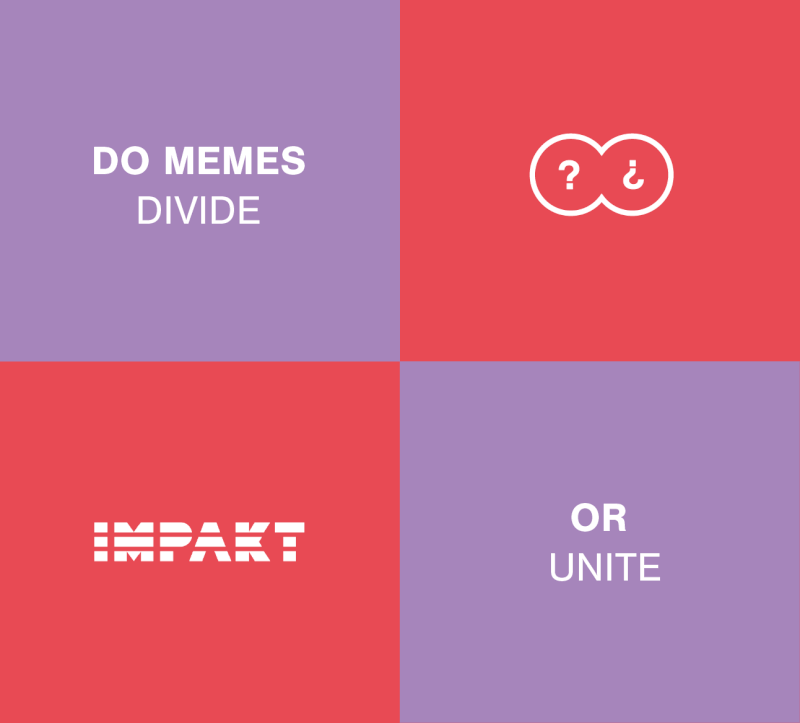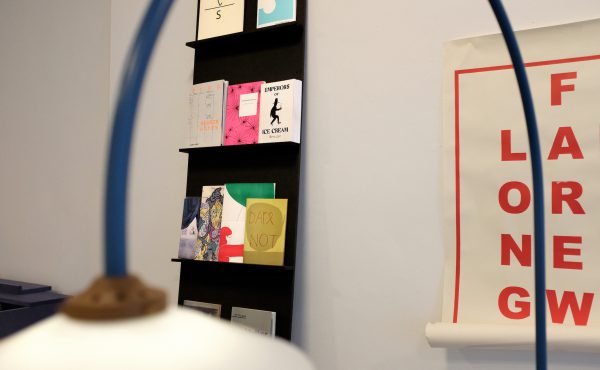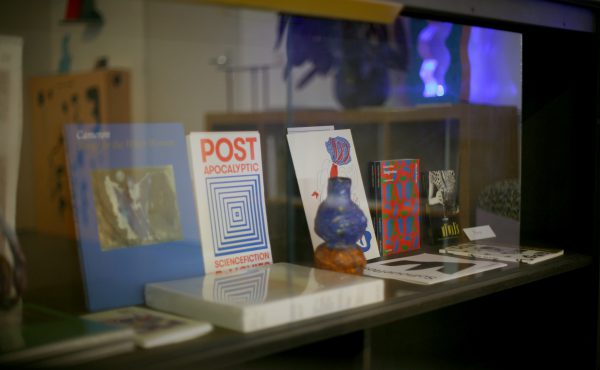
Page Not Found, Space To Share
Bookshop Page Not Found recently moved to a larger location, just 40 meters away from its previous address in The Hague. Beatrice Cera talks to founder Sébastien Tien and co-director Ola Vasiljeva about artist books, artistic publishing and their plans for the future, including more shows, like Transplantation Library, which is opening this Friday..
Page Not Found was one of the first art and design spaces I discovered when I moved to The Hague. As often happens when transitioning from a previous home to a new environment, I immediately sought out spots that felt familiar to me – in this case, places related to books and design. However, Page Not Found is much more than just books and design. Sébastien Tien, the founder, and Ola Vasiljeva, the co-director, organised the space and its program as a platform for community and artistic practices. In this context, publishing plays a binding role (pun intended), acting as a common thread connecting workshops, talks, screenings, exhibitions. As a ‘space’ – defined as a cultural initiative with a physical public presence – one is privileged to have the opportunity to host and facilitate community.
This, of course, is a choice. It is no secret that space, and our inability to share it – especially in the form of land – is one of the most critical issues of our times. There is a lack of accessible space, communal space, and non-hierarchical space. What can an art and publishing initiative do in these circumstances? This is an open question, and perhaps one that should remain open to multiple answers. I had the pleasure of discussing Page Not Found’s approach with Sébastien and Ola. The conversation began with the fact that they recently moved to a larger location, just 40 meters away from their previous address.

Sébastien
‘Our previous project space often felt too tight. Our events would get so packed that we had to turn people away, which was frustrating. Having a bigger space opens up more possibilities for exhibitions, workshops, radio broadcasts, and more. The storage was overflowing too. We felt like we’re growing and we needed to change clothes. We’ve been searching for a while, and this space was looking at us every day.’
Ola
‘We definitely wanted to stay on the same street [Boekhorstsraat, in The Hague], because we really love the location. When this place became available, it was very tempting.’
Sébastien
This space is very interesting because it’s one big square. We designed moving walls so we can adjust its size and adapt it to each exhibition.’
'We designed moving walls so we can adjust its size and adapt it to each exhibition’
A new feature of the new location is an extended exhibition programme that complements the existing activities such as various workshops, Typographic Nights, Open Letters (text-based artworks selected from an open call and periodically exhibited in the shop window), in addition to the bookshop.
Sébastien
‘At the core of Page Not Found is the artist book and, more generally , artistic publishing, which carries the promise of moving art from institutions and galleries to the community. A bookshop becomes a vector for works that are ‘copied’ and therefore much more accessible. We want to engage with different communities through workshops, screenings, and talks, and as a result, we have always hosted many events.’
Ola
‘At the heart of Page Not Found is the project space and the dissemination of artists’ ideas, showcasing their processes, thinking methods, and approaches.’
Sébastien
‘The artist book is a hybrid, functioning both as a work of art and a common commodity. We embrace this dual nature: at times a bookshop, at others a gallery. Still, the core of our work remains the organisation of events.’
Ola
‘Over time, we began working in larger cycles. For example, this year we launched Mal d’Archive, with Dominique Hurth as the inaugural example, featuring the exhibition Double Exposure(s) (now closed) and the publication Stutters.’
Sébastien
‘Many artists are intrigued by exploring the archive in a personal way. We’ve seen numerous instances of these explorations through publications, which prompted us to create this programme. The most important question remains: how can we contextualise an artist’s publishing practice within their wider artistic endeavours? We believe there’s a strong connection between why an artist chooses to paint or make music and their decision to delve into publishing. It’s very interesting to let artists determine how they will use this platform to illustrate and position their publishing in a way that is unique to them.’
Beatrice
So in this case, publishing is more a practice focused on disseminating knowledge rather than solely bookmaking.
Sébastien
‘Exactly. It’s about making knowledge public. Publishing can manifest in various forms: it can be a broadcast, a vinyl record, an online project, and so forth. What’s intriguing is how artists utilise these forms. There’s potential for a more democratic art – art that is more accessible. Our focus is thus on accessibility, on reaching out to people beyond the typical audience of an art gallery or institution. For example, we’ve been considering the threshold effect and how to mitigate it. We’ve deliberated on which entrance of our space to emphasise – towards books or towards exhibition – as this influences whether people ‘dare’ to walk in. Our furniture is designed to be engaging and playful, potentially sparking more curiosity than a traditional bookshop or a white cube.’
Ola
‘We both come from working-class families and were the first in our families to pursue higher education. I think this background gives us a specific understanding of the importance of accessibility in an art space. We always bear this in mind when developing our programmes, striving to ensure they are inclusive. For example, we launched the NEU Commission, an open call for non-EU students enrolled at Dutch arts academies. These students face substantially higher fees, and many struggle to afford their education, let alone complete it. So, we established a commission for them to write a text, and the selected students received an artist fee for their contribution. That helps, perhaps, to pay their tuition fee. The jury comprised the team of Salwa foundation. This initiative exemplifies our commitment to addressing the specific needs of particular communities regarding access.’
'Publishing can manifest in various forms: it can be a broadcast, a vinyl record, an online project, and so forth. What’s intriguing is how artists utilise these forms. There’s potential for a more democratic art – art that is more accessible'
Beatrice
This also highlights how art can serve as a bridge between individuals facing a certain struggle and a means of providing assistance.
Ola
‘I’m an artist myself. My work revolves around publishing, so when Sébastien initiated the space, I was naturally curious about it, which is what attracted me to it. Sébastien has training as engineer and artist. We don’t really see ourselves as curators. For instance, we never explicitly stated that Dominique’s exhibition was “curated by …”. For us it’s more about sharing the space.’
Sébastien
‘If we do engage in curation, it’s centred around providing access. We focus on specific communities that we believe could particularly benefit from an initiative like ours, offering them a space to gather and seeing their voices amplified. It’s a labor of passion, and it demands a lot. However, can one do this solely out of passion for a few years before facing the reality check: is this sustainable? I volunteer here, and Ola was underpaid until recently because we couldn’t afford more. We insist in properly compensating every collaboration we initiate – it’s not about relying on exposure as in the old model. The issue lies in the cultural sector being currently in limbo, awaiting decisions on government support in June – July. This support is crucial for the sustainability of art spaces.’
To wrap up our conversation, and maintaining confidence in the ministry’s support, we briefly touch on Page Not Found’s future plans.
Sébastien
‘In June and July, we are hosting a presentation by Transplantation, an organisation based in Paris that has been actively collecting and showcasing publications on art, history, critical thought, literature, and media from a diasporic, African, and global perspective. Similar to us, they have a library and organize exhibitions. Although they are quite active in France, they haven’t had much exposure abroad. We wanted to bring them here as a means to engage with a community we didn’t specifically engaged with before, namely people and artists of African descent. Amandine Nana, the founder of Transplantation, also proposed organising two workshops for children and teenagers around the possibilities of publishing, collages, and zine-making. The exhibition will open this Friday, and will last for a month.’
Opening of the new exhibition: “Transplantation Library: Reading Hall,” on Friday, June 28, at 19:00!
Beatrice Cera



























